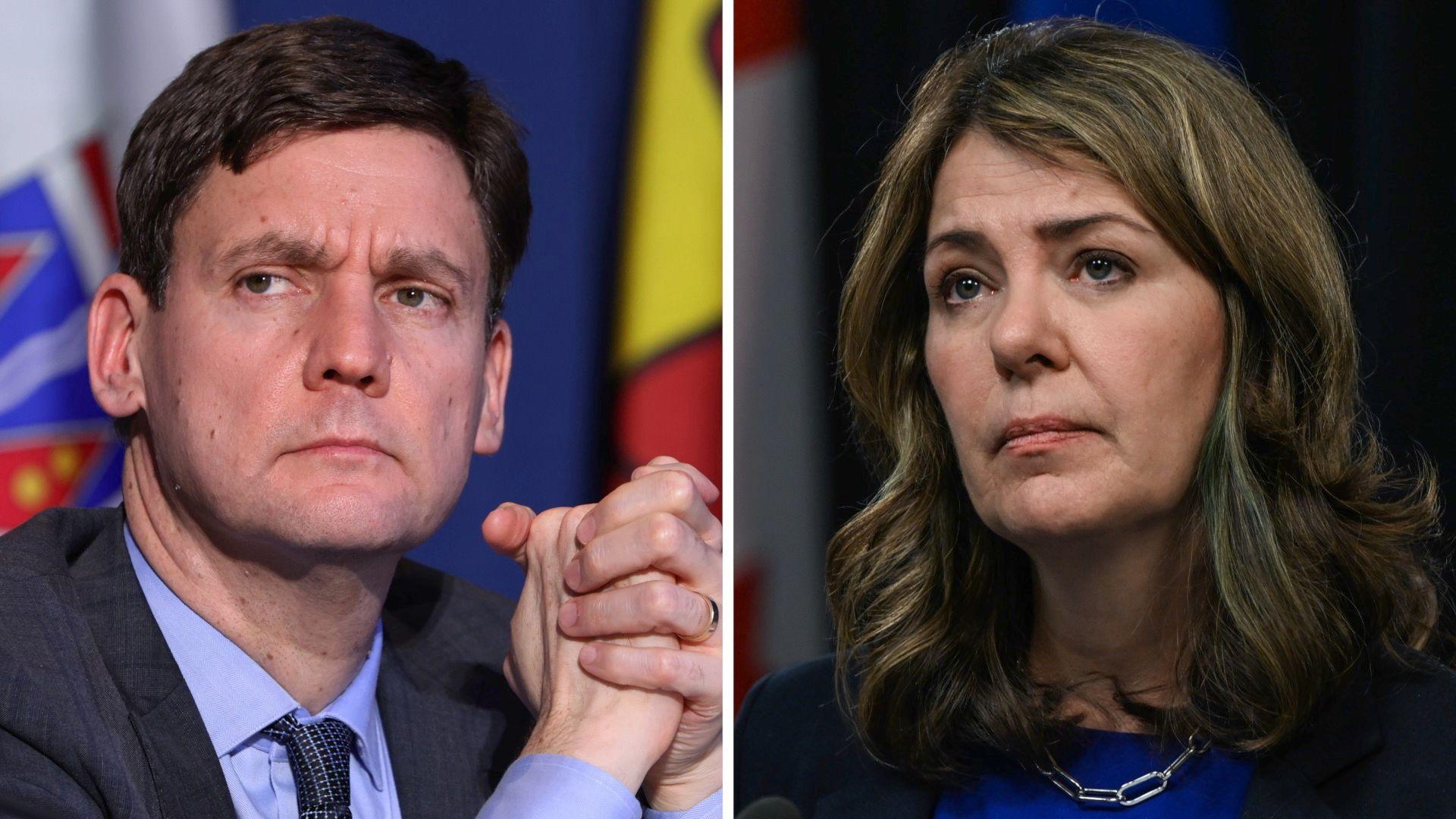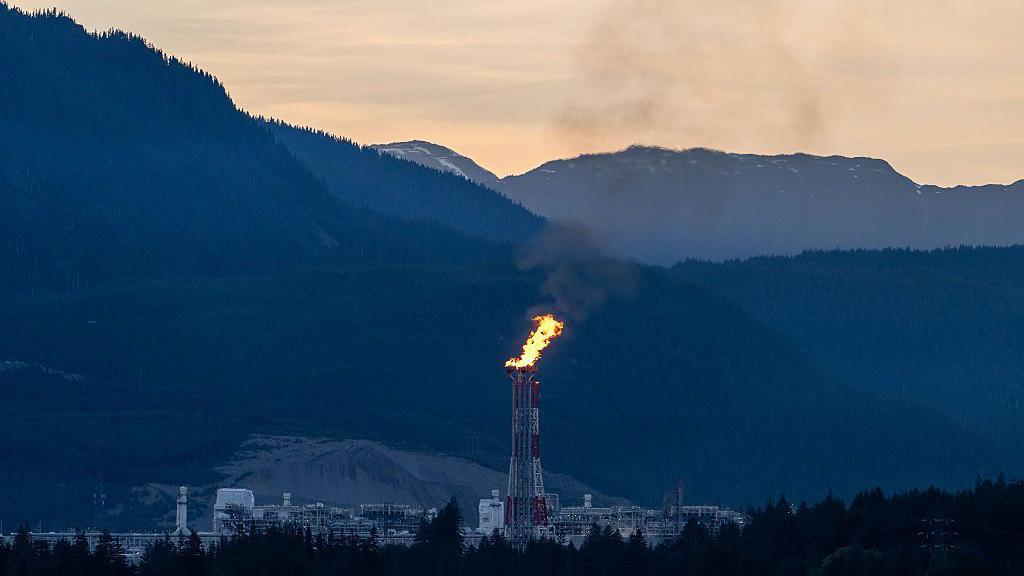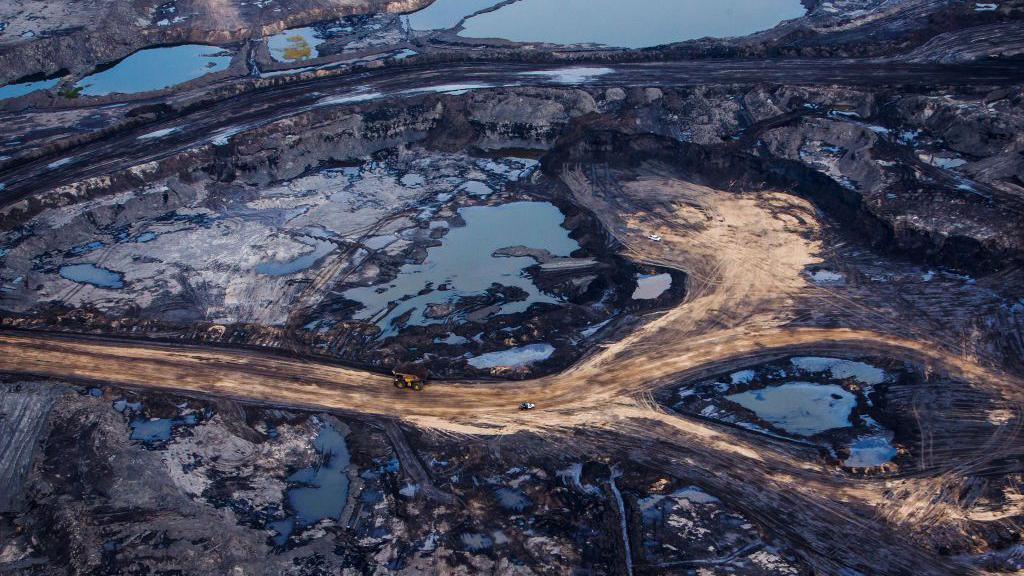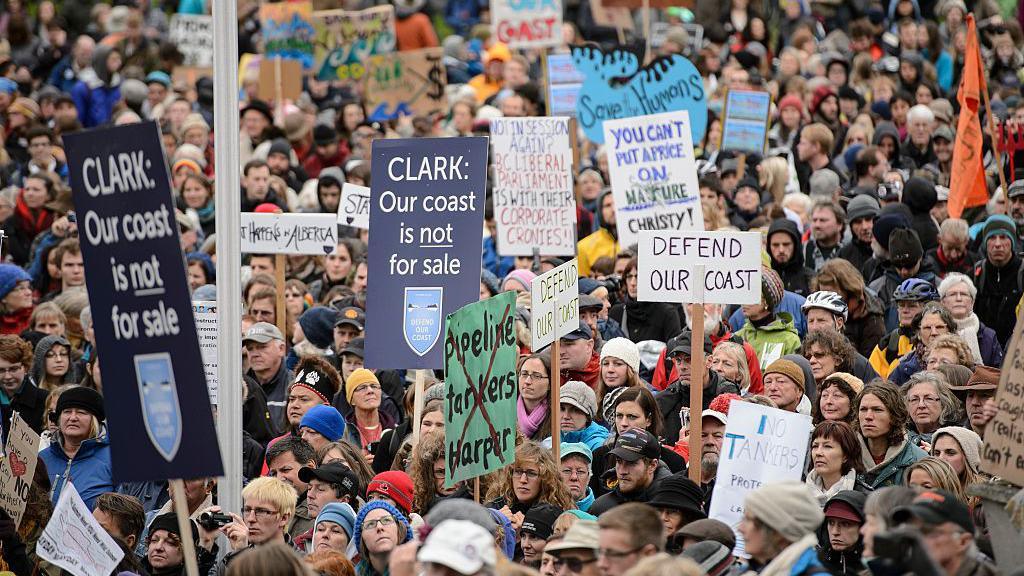The oil pipeline feud testing Canada's global ambitions

British Columbia Premier David Eby has dismissed Alberta's hopes of building a pipeline through his province to the Pacific. Alberta Premier Danielle Smith has called him "un-Canadian"
- Published
As Canada looks to untangle itself economically from the US, the country's landlocked oil patch is eyeing new customers in Asia through a pipeline to the Pacific. Not everyone is on board.
The oil-rich province of Alberta has had one demand for Prime Minister Mark Carney: Help us build an oil pipeline — and fast.
It's no small task — in fact, some argue it has become near-impossible to build a pipeline in Canada because of laws designed to bolster environmental protections. Three oil pipelines have died on the vine in the past decade over fierce opposition.
But Alberta Premier Danielle Smith is not deterred.
Her conservative government has taken the unusual step of drafting its own proposal for a pipeline from the Alberta oil sands to British Columbia's northern Pacific coast, aimed at reaching Asian markets. Still in the early stages, Smith hopes that by doing the groundwork a private company will eventually take over and build it.
Neighbouring British Columbia, however, is firmly against it. Premier David Eby, with the left-leaning NDP, has dismissed Smith's plan as "fictional" and "political", arguing no company wants the burden of taking it on. He also accused Smith of jeopardising his own province's ambitions to expand liquified natural gas (LNG) exports to Asia.
Smith in turn, has called him "un-Canadian".
The feud between the Western provinces comes at a critical time. Canada is trying to wean itself off its economic dependence on the US amid President Donald Trump's tariffs, and Carney has signalled his desire to double non-US exports in the next decade.
That includes positioning Canada as a global "energy superpower". Almost all of its energy exports, including crude oil, are currently sold to the US.
On Thursday, Carney unveiled new "nation-building projects" he says are key to Canada's growth. The list did not include a pipeline, but does include critical minerals mines and an LNG project in BC.
With Canada home to one of the world's largest oil reserves, Carney is now facing questions from Albertans over whether he can achieve his goals without first solving the internal rifts.
"It is the perennial problem," said Heather Exner-Pirot, director of natural resources, energy and the environment at the MacDonald-Laurier Institute think tank, and who is based in Calgary, Alberta.
"It is unfortunately the main wedge issue in Canadian politics it seems like, and trust me when I say no one in Alberta wishes that their oil was the wedge issue in this country."

British Columbia has been pursuing LNG exports to Asia, though some of those projects are also opposed by climate groups and some First Nations.
Asked about the divides on Thursday, Carney said the federal government and the provinces "need to talk to each other".
"We need to see where we can cooperate and build things, and we need to acknowledge where we can't."
Separately, Carney has hinted that he wants to see another pipeline built: Keystone XL to the US. Sources have told the BBC that reviving the project was raised during the prime minister's last face-to-face meeting with Trump in October, before the US president halted trade talks with Canada over an anti-tariff ad.
For Ms Exner-Pirot, the suggestion of Keystone XL may signal a resignation that the rift between BC and Alberta won't be resolved.
"At the end of the day, it still looks like it's going to be easier to negotiate a new pipeline with the Americans than with British Columbia."
Six takeaways from Canada's federal budget
- Published5 November
Carney and Trump discussed Keystone XL pipeline revival, sources say
- Published8 October
Carney has avoided siding with either province but has signalled his openness to a pipeline if Alberta can commit to also developing its carbon capture and storage programme. He said discussions "are going well".
In a statement to the BBC, Smith's office said it is "working to address" Premier Eby's concerns. But it said it expects Carney's government to support their project.
"We have to decide if we are going to operate like a country and trade with each other, tear down internal trade barriers and stop blocking each other's projects and opportunities to trade with the rest of the world," Smith's spokesperson, Sam Blackett, said in an email.
The BBC contacted Premier Eby's office for comment, who pointed to remarks the BC leader made to reporters on Thursday.
"There is no route, there is no proponent, there is no project," he said, adding he remains "frustrated that this appears to be an ongoing issue for Premier Smith".

Canada is home to one of the largest oil reserves in the world, the bulk of which are in Alberta. It exported an average of 4.2 million barrels a day in 2024.
'Real grounds for dispute'
The disagreement between BC and Alberta is part of a longstanding clash that successive federal governments have struggled to smooth over.
British Columbia is historically home to Canada's environmental movement – it's the birthplace of Greenpeace, one of the world's largest climate organisations.
Alberta's main export by far is crude petroleum, and it has long defended its oil and gas industry as vital to Canada's economic growth.
"There are real grounds for a dispute," said Andrew Leach, a Canadian energy economist at the University of Alberta. "The lion's share of the gains and the benefits accrue to Alberta, while the lion's share of generational risks occur in BC."
It was opposition in British Columbia that led to the cancellation of Enbridge's Alberta to BC Northern Gateway pipeline project. It was scrapped in 2016 after courts ruled that indigenous communities were not properly consulted. Enbridge said it spent more than C$370m ($263m; £200m) on the failed project.
Asked about Alberta's new proposal, Enbridge spokesperson Gina Sutherland told the BBC that the federal government needs to improve its regulatory policies "before any new large energy projects would be considered".
Alberta says those policies, including an oil tanker ban off the coast of BC, which both Premier Eby and BC indigenous leaders want to keep in place, are hindering energy development.
The sole oil pipeline running from Alberta to BC, TransMountain (TMX), was also strongly opposed and only finished after the federal government purchased it for C$4.5bn in 2018 to ensure its completion. The total cost for the project was C$35bn.
TMX is estimated to have since generated more than C$12.6bn in oil revenue for Canada, according to a report by Alberta Central, external, and has helped non-US crude oil exports jump sixfold, external in the last year.
An October poll from the Angus Reid Institute, external shows a majority of Canadians (59%) support the idea of a second Alberta-BC pipeline, including 56% of BC residents.

In 2012, protests against the Northern Gateway pipeline in British Columbia drew thousands.
But indigenous sovereignty and environmental are still significant factors - Canada has pledged to halving its greenhouse emissions by 2035. The country has seen the impact of climate change firsthand, including a recent string of its worst wildfire seasons on record.
Keith Brooks, director of programmes at Environmental Defence Canada, said he believes any move towards a new pipeline would be met with a backlash.
"We would condemn it quite loudly," Mr Brooks said predicting legal challenges from First Nations communities along its route, as well as protests.
He argued that an oil pipeline would also take years to build, and therefore do little to address Canada's immediate financial challenges.
"It does nothing for us today," he said.
The opposition appears to already be taking shape.
"Our communities will not be collateral for private profit," said Chief Na'Moks of the Wet'suwet'en First Nation in northwest BC, who was among a group of indigenous leaders who had gathered to protest the prime minister's Thursday announcement.
"This is colonial violence masked as 'economic development,' and the world is watching."